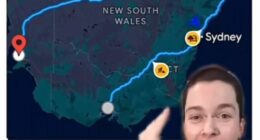NSW Rail, Tram and Bus Union (RBTU) state secretary Toby Warnes said the city’s train network could be a “similar situation to Friday” unless the “lockout” notices issued by the government are rescinded.

A worker issued such a notice who comes to work but takes part in industrial action such as a “go-slow” day – driving trains lower than the speed limit – can lose their whole day’s pay.
“This is going to come as cold comfort to commuters, but we don’t know [if] these 5000 lockout notices [will] stay in place,” Warnes said.
“The nature of these lockout notices say that if you do come to work and you are found to be going slow, which is our original ban, you will lose an entire day’s pay.

How much train drivers are paid across Australia
“So our members are in a really hard position at the moment, choosing between potentially working for free for a day or not coming to work at all.”
Warnes added: “And we saw on Friday 600 people made the latter choice.”

Warnes said the outlook for this week remains “unpredictable”.
The Fair Work Commission will hand down its decision over whether it will uphold the state government’s 418 application, which is an order to stop or prevent unprotected industrial action.
Warnes told RBTU members yesterday that a decision is likely to come today at 1.30pm which will decide what this week’s industrial action may look like.
“The government is spending millions and millions of dollars trying to fight members,” Warnes said in a message on Facebook.
“Stay united, stay strong… we are going to get a good deal out of this.”


Commuters on Friday faced a nightmare journey home after 90 per cent of train services were cancelled following half the rostered train drivers and guards not turning up for work.
More than 570 drivers did not show up for work that day, causing mass cancellations across the network and plunging the public transport system into chaos.
The T4 Eastern Suburbs & Illawarra Line was the worst affected with virtually no trains running on the line.






